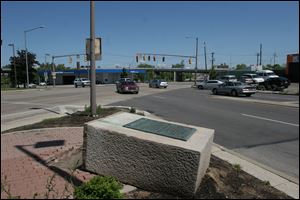
Marker found overturned in central Toledo
2nd Great Trail monument in month displaced from home
5/11/2012
The Great Trail marker at Detroit and Cherry commemorates the Native Americans' wilderness path between Detroit and Pittsburgh.
It has been a rough spring to be a historical marker for the Great Trail.
Little more than a month after a tractor-trailer driver dragged one such monument for four miles into Toledo under his rig after striking it in Maumee, one in central Toledo was reported Thursday to have been knocked over.
David Pratt, the city's commissioner of streets, bridges, and harbor, said workers from his department and the division of parks, recreation, and forestry plan to team up today to right the stone monument at North Detroit Avenue and Cherry Street and, as long as it isn't significantly damaged, reset it in its proper place.
City officials estimate the marker, like its counterpart at South Detroit Avenue and River Road that was struck and dragged April 5, weighs several tons. How it was knocked over remained a mystery Thursday. Its condition was reported to city officials by a police sergeant on patrol.
Charges are pending in Maumee Municipal Court against the truck driver whose rig struck the marker in Maumee while turning left from South Detroit onto River after earlier making a wrong turn onto South Detroit from the Anthony Wayne Trail while trying to get to I-75.
Liviu Dumbrava, 49, of Dearborn Heights, Mich., was charged with failure to control, making an unsafe turn, and leaving the scene of an accident after striking the marker in Maumee.
The charge of failure to control has been dismissed, and a hearing on the other two counts is scheduled for May 22.
Both historical markers commemorate the Great Trail, a wilderness path established by Native Americans before the French and Indian War that was later used by the French, the British, and, in 1812, by U.S. Gen. William Henry Harrison.
Extending from Detroit to Pittsburgh, the trail was regarded as the most important early route of the central west, according to the inscription on the Maumee marker, erected in 1913 by the Daughters of the American Revolution, Ursula Wolcott Chapter.
Mr. Dumbrava told investigators that he made the right turn from the Anthony Wayne Trail onto South Detroit based on instructions from a global-positioning device in his rig. He then continued to follow the device's instructions, which included the left turn onto River that was too tight for his rig to negotiate without its trailer's wheels rolling through a small park on that intersection's northwest corner.
Along with damaging flower beds in the park, the trailer snagged the historical marker and dragged it as the truck proceeded north on River Road into Toledo. It finally stopped after returning to the Anthony Wayne Trail via Glendale Avenue, by which time the marker had significantly damaged the truck's brake rigging, investigators said.
The dragging marker left a trail of gouges on the pavement over the entire route.
Joe Camp, Maumee's public service director, said Thursday that Design Memorial is expected to retrieve the Maumee marker by early next week and begin a restoration that is expected to cost about $3,100, including the cost of resetting it in the park at South Detroit and River.
Contact David Patch at: dpatch@theblade.com or 419-724-6094.